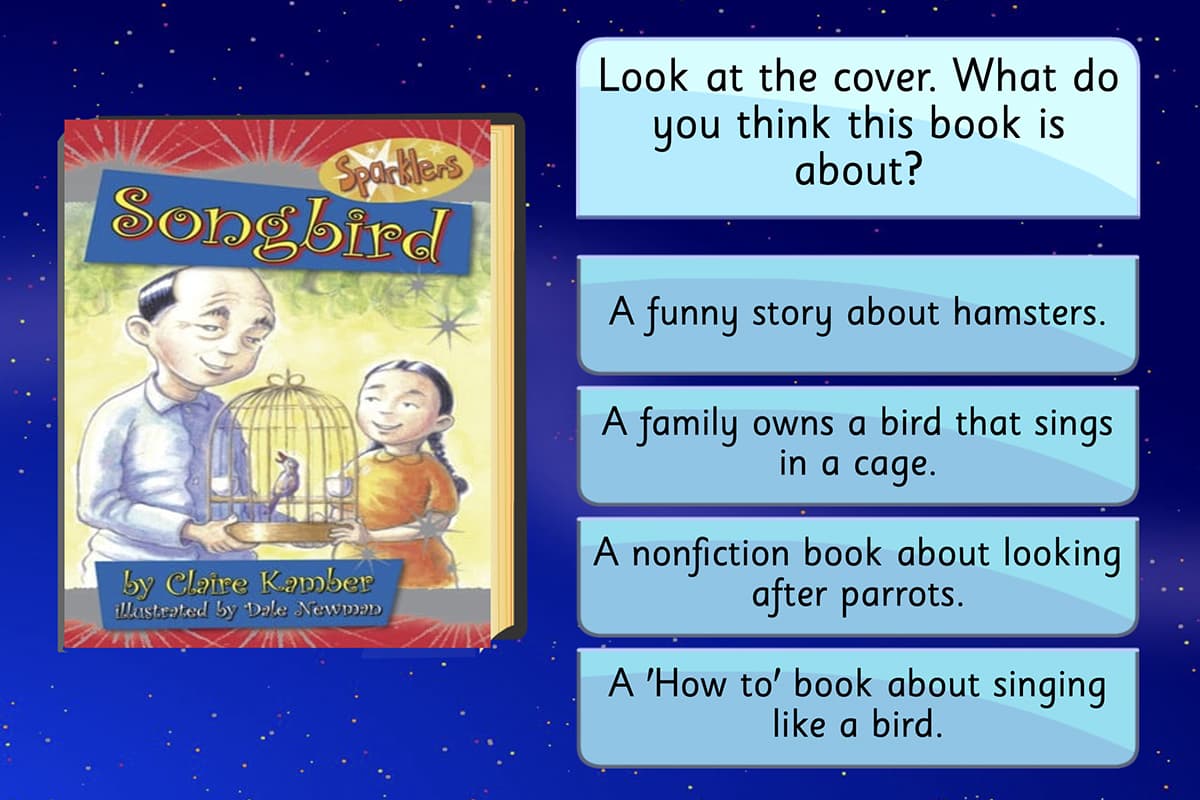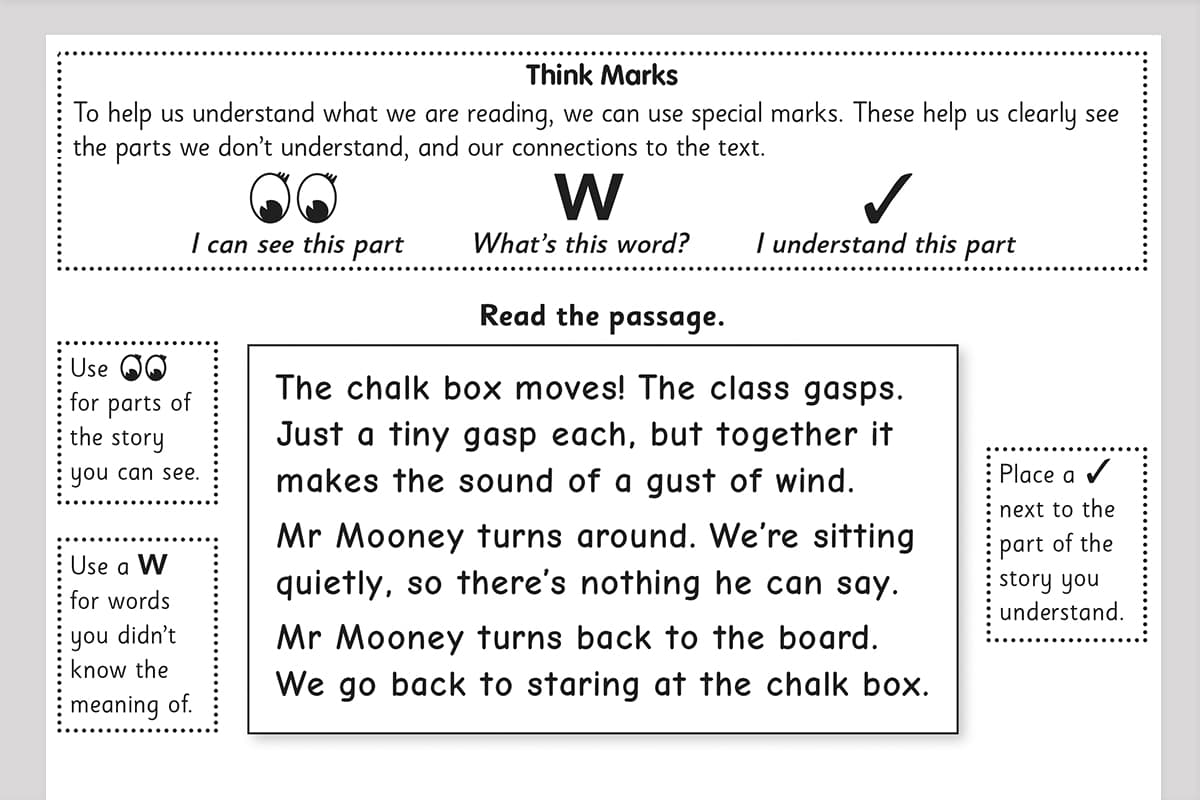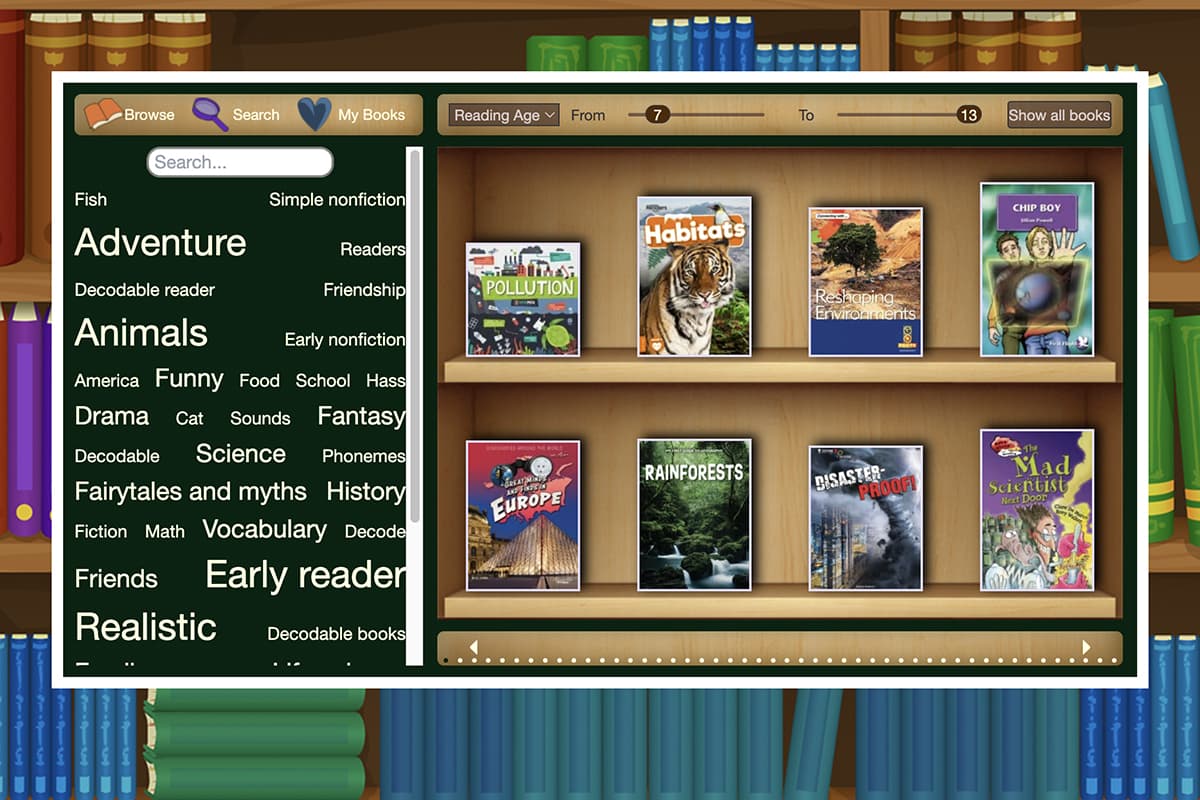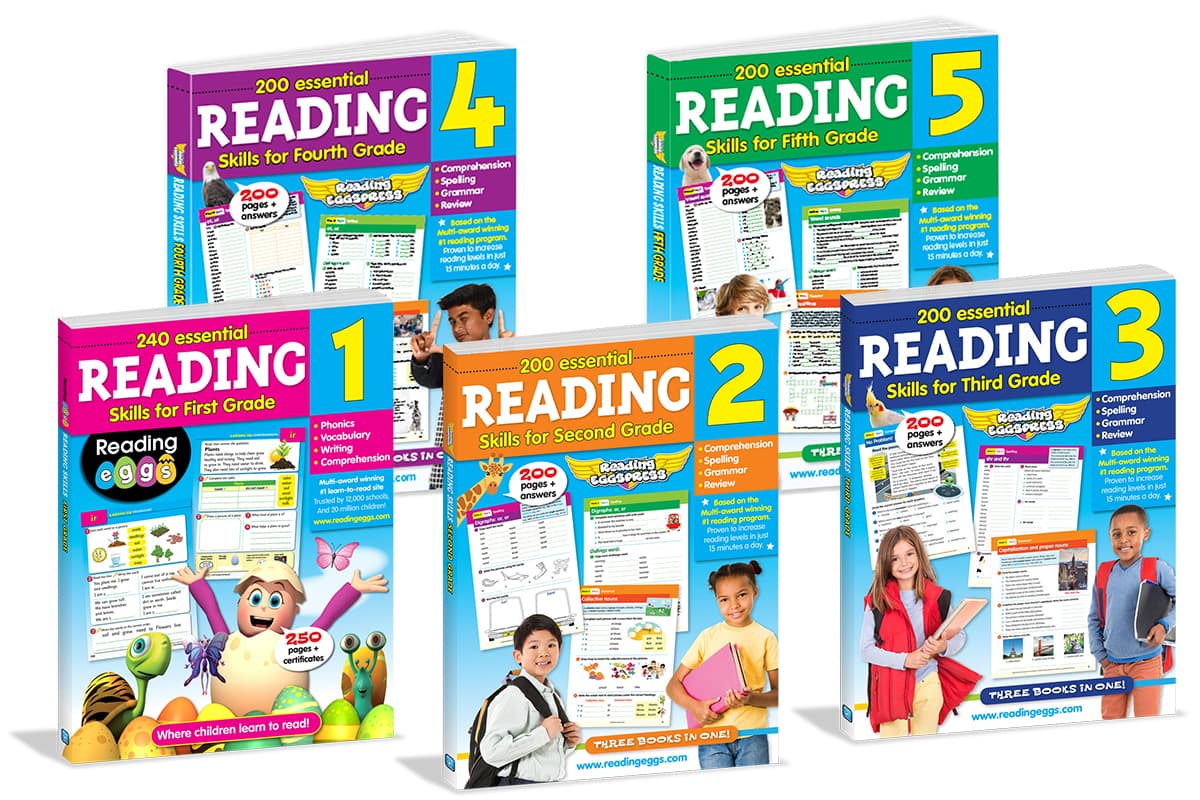


How To Improve Your Child’s Reading Comprehension Skills: Tips and Strategies for Parents

Struggling with comprehension can be a frustrating experience for children and parents but there are strategies you can use to improve their reading comprehension skills.
One of the most important skills children need to acquire on their learning journey is reading comprehension – the ability to not just read words, but to truly understand and engage with written materials. It’s the key to transitioning from ‘learning to read’ to ‘reading for meaning’ and, crucially, ‘reading to learn’.
Experiencing challenges with reading comprehension can be difficult for both children and their parents. However, with the right support, children can build confidence and overcome obstacles. If your child is struggling with reading comprehension, know that you’re not alone – many children need help to improve their reading comprehension skills at some point on their journey.
The good news is that there are simple yet effective strategies you can use to support and encourage your child.
In this article we’ll explore practical tips and techniques to improve reading comprehension, helping your child progress beyond decoding and recognising words to engaging with stories and information.
It’s important to remember that every child learns at their own pace. With patience and consistency, you can help your young reader unlock the joy and knowledge that comes from truly understanding what they read.
what-is-reading-comprehension-jump-link
What is reading comprehension?
Reading comprehension is the ability to read text, process it and understand its meaning. Comprehension goes beyond decoding and recognising the words on a page; it's about extracting meaning, making connections and thinking critically about the text. Comprehension often requires readers to use their background knowledge and critical thinking skills to make sense of what they’ve read.
Reading comprehension occurs through a combination of bottom-up (text-based) and top-down (knowledge-based) cognitive processes:
Decoding the text (recognising letter-sounds and words)
Using vocabulary and grammar knowledge to understand the literal meaning
Making inferences (educated guesses) and connections
Integrating new information with existing knowledge
Checking for understanding and adjusting reading strategies as needed.
Comprehension is a key reading milestone in children's development. Initially, children learn to decode words and develop phonological processing skills. As they become fluent readers, they start to focus more on understanding the text. This shift is crucial for their overall literacy development and helps them gain more enjoyment from reading.
Help your child improve their reading comprehension with Reading Eggs!
Designed for ages 2–13, Reading Eggs is the multi-award winning online reading program that guides children on their reading comprehension journey. Young readers (ages 3–7) learn basic comprehension skills through book quizzes, while older children (ages 7–13) develop more complex comprehension skills and strategies in Reading Eggspress. Downloadable activity worksheets and over 4000 e‑books in the online library allow children of all ages and reading levels to practise and perfect their skills. Try it for yourself today with a 30-day, risk-free trial.
reading-comprehension-milestones-jump-link
Key reading comprehension developmental milestones
Basic comprehension (ages 6–8): Children begin to read simple texts and answer basic questions about the content. They start making connections between the text and their own experiences.
Complex comprehension (ages 9–12): More complex texts are introduced, including narratives and expository writing. Readers learn to identify main ideas and supporting details and to infer meanings.
Critical analysis (ages 13–18): Teens develop the ability to analyse and critique texts, understand different viewpoints and synthesise information from multiple sources. They are expected to engage in more sophisticated reading tasks, such as analysing themes and the author’s purpose.
Advanced comprehension (ages 18+): Adults continue to refine their comprehension skills through varied reading materials, including professional, academic and leisure texts. Advanced comprehension involves nuanced understanding and the ability to engage with complex, abstract ideas.

Reading Eggs (for ages 3–7) helps children develop basic comprehension skills with book quizzes at the end of each lesson. Reading Eggspress (for ages 7–13) teaches older children more complex comprehension skills and strategies. Free trial
reading-comprehension-importance-jump-link
Why are reading comprehension skills important?
Having strong reading comprehension skills is an important foundation for academic success, personal growth and professional development.
Students will need comprehension skills to understand textbooks and other educational materials to gain new knowledge and grasp complex concepts as they progress in their education.
On a personal level, reading comprehension skills enable individuals to explore new ideas and pursue areas of interest.
The analytical and critical thinking skills that accompany reading comprehension are important life skills that help in decision-making and problem-solving.
reading-comprehension-challenges-jump-link
Common reading comprehension challenges faced by children
Children can face a range of challenges with reading comprehension that impact their ability to fully engage with texts and enjoy reading. Some common difficulties include:
1. Decoding and fluency issues
Decoding difficulties: Struggles with decoding words can affect comprehension. If children have difficulty reading the words on the page, they are less likely to focus on understanding the meaning of what they’re reading.
Fluency: Poor reading fluency, including slow or choppy reading, can impede comprehension. When children are not able to read smoothly, their cognitive resources are consumed by the process of decoding rather than understanding the text.
2. Difficulty with vocabulary
Limited word knowledge: Children who have a limited vocabulary may find it hard to understand texts that use complex or unfamiliar words. This can hinder their overall comprehension as they may not grasp the meaning of sentences or passages.
Context clues: If children aren’t adept at using context clues to infer the meanings of unknown words, they may find it difficult to follow the narrative or main ideas.
Background knowledge gaps: A lack of understanding of the subject matter or related topics can make it harder to comprehend the text.
3. Poor engagement and lack of motivation
Interest in the text: If children are not interested in the subject matter or if the text is not age-appropriate, they may be less motivated to engage with the content, leading to decreased comprehension.
Perceived difficulty: If children find a text too challenging, they might become discouraged, which can affect their willingness to persist and fully engage with the material.
4. Inability to connect ideas within the text
Sequential understanding: Children may have trouble following the sequence of events or understanding how different parts of the text relate to each other. This can be particularly challenging in texts with non-linear narratives or complex structures.
Thematic connections: Recognising and connecting overarching themes or ideas within a text can be difficult, leading to fragmented understanding and missing out on the deeper meaning of the material.
5. Struggles with inference and drawing conclusions
Implicit information: Many texts require readers to infer information that is not explicitly stated. Children might struggle with making these inferences, leading to a superficial understanding of the text.
Critical thinking: Drawing conclusions based on evidence within the text requires critical thinking skills that may be underdeveloped in some children. They might find it hard to synthesise information or make predictions based on textual clues.
6. Trouble focusing on longer texts
Attention span: Maintaining focus over longer texts can be challenging, especially for younger readers or those with attention difficulties. This can lead to missing important details and overall confusion.
Difficulty with structure: Longer texts often have more complex structures, such as multiple subplots or detailed explanations. Children might find it hard to keep track of these elements, which can disrupt their understanding.
7. Poor short-term memory and information recall
Short-term memory: Comprehension often relies on the ability to remember and recall information from earlier in the text. Children with poor short-term memory might find it challenging to keep track of key details and plot developments.
Integration of information: Combining new information with what they already know can be difficult, affecting their ability to build a coherent understanding of the text.
These challenges vary from child to child and can be influenced by factors such as age, reading level and learning style.
Addressing these challenges often requires a combination of strategies tailored to individual needs.
For example, children with Autism Spectrum Disorder (ASD) can face distinct challenges with comprehension. Children with ASD are usually more capable of answering literal comprehension questions rather than inferential, so focus on Who, What, Where and When questions. Learn more about reading and autism.
reading-comprehension-tips-strategies-jump-link
Top tips and strategies for improving your child's reading comprehension skills

Think Marks are a reading comprehension strategy that can be used to develop active reading skills. In addition to the online lessons, Reading Eggs provides hundreds of reading comprehension worksheets that are free to download. Free trial
Helping your child improve their reading comprehension and watching their growth can be a rewarding journey. Below you’ll find some useful tips and effective strategies that you and your child can use to build strong comprehension skills and foster a lifelong love of learning:
1. Create a reading-friendly environment
Create a cozy reading ‘nook’ or space that is quiet and comfortable. Make sure it is free from distractions and filled with a variety of books that interest your child.
2. Establish a regular reading routine
Establish a consistent time for reading each day. This builds a habit and makes reading a normal part of the day. Schedule a mix of independent reading and time for reading aloud together.
3. Read aloud together
Take turns reading books aloud with your child. Reading together allows parents to model good reading habits and intonation. It can also spark conversations about the story. Reading aloud encourages children to slow down and process the text more thoroughly. It also helps to improve reading fluency.
4. Choose appropriate reading materials
Select books that match your child’s interests and reading level. Books that are too difficult can lead to frustration, while those that are too easy might not provide enough challenge. ‘Just right’ books will challenge them without causing frustration. Allow time for independent reading and let your child choose books they’re interested in.
5. Provide diverse reading materials
Expose your child to various genres and text types to broaden their comprehension skills. Let them look at magazines, brochures, leaflets, emails and lists that you have written. Point out the layout and purpose of the different pieces of writing. Include both fiction and non-fiction materials that align with their interests.
Reading a recipe and following the instructions is an excellent way of building comprehension skills. Encourage your child to help you in the kitchen with cooking or baking. Read the recipe aloud and explain how you need to follow each step to achieve a specific result.

The Reading Eggs library contains over 4000 levelled e-books covering a diverse range of genres and topics, making it easy for children to practise and improve their reading comprehension skills. Free trial
6. Vocabulary support
Introduce new vocabulary words (preferably before reading) and explain their meaning. Teach your child to use context clues to determine the meaning of unfamiliar words they encounter while reading. Keep a word journal to record new words and their meanings.
7. Pre-reading preparation
Employ pre-reading strategies. Before diving into the text, review titles, headings and images to get an overview. Look at the picture on the front cover and ask your child what they think the story might be about. Point out the author and illustrator. Show them the back cover and read the synopsis of the story. Discuss what they already know about the topic to activate prior knowledge.
8. Make predictions
Before reading, ask your child to predict what they think will happen. During reading, stop and ask your child what they think might happen next. Ask them why they think those events might happen and what effect they might have on the characters or plot.
9. Practise active reading
Use reading comprehension worksheets to practise active reading. Show your child how to use Think Marks to highlight words they don’t know, as well as the text they can understand and visualise. When reading books, get them to use sticky notes to mark important passages or jot down questions. This keeps engagement high and aids retention.
10. Visualisation
Visualising the text is a fun way to improve comprehension. Encourage your child to create mental images of what they’re reading, pausing if they need to. This technique can help them better understand the events and characters and to retain information. For younger children, provide materials to create homemade storybooks with drawings of the characters and scenes from the story. Graphic organisers and visual aids, such as story maps or Venn diagrams, can help older children visualise the relationships between characters, events and ideas in the text.
11. Ask questions
Engage in conversations about the book before, during and after reading. Ask open-ended questions like, “What do you think the book is about?”, “What interests you about the book?”, “Who are the main characters?”, "What do you think will happen next?" or "Why do you think [character] did that?" This will help your child think critically about the text.
12. Activate background knowledge
Relate the content to real-life experiences, personal interests or other knowledge. Making connections can deepen understanding.
13. Chunking information
Split reading long texts into small, manageable sessions. This can help prevent your child from feeling overwhelmed and losing focus. Set goals for each reading session and take breaks in between.
14. Sequencing
Sequencing helps with understanding plot developments and key events in a story. When following directions, it can be important that each step is completed in the correct order. A fun activity to build sequencing skills is to read a comic strip with your child, cut up the individual frames and ask your child to put the frames back in the correct order (you might need to take a copy before cutting to use for reference).
15. Summarisation
After reading a text, discuss what happened. Ask your child to retell stories or events and to offer their opinion. “How did the story make them feel?”, “What did they enjoy most?”, “What did they dislike and why?” Have your child summarise the main points of a story or article in their own words. This helps them identify the most important information and reinforces understanding.
16. Incorporate multi-sensory activities
Go beyond the page and incorporate multi-sensory activities as a fun way to enhance reading time and reinforce comprehension. Re-enact scenes from a favourite story with hand puppets and prompt your child to act out what the characters would do and say.
17. Utilise technology
Use evidence-based reading apps and online programs like Reading Eggs and Reading Eggspress that offer interactive comprehension lessons and assessments. These technology solutions include features like read-aloud book options to develop fluency, comprehension quizzes, regular progress monitoring and reporting.
Reading Eggs (for ages 3–7) teaches basic comprehension skills with book quizzes at the end of each lesson (from Lesson 9). Children can also choose to read additional books from the library of over 4000 titles.
Reading Eggspress (for ages 7–13) includes 220 structured comprehension lessons designed to teach a range of comprehension strategies, increasing in difficulty as children progress.
The lessons use a balance of carefully levelled literature and nonfiction texts and include pre-reading activities, interactive quizzes and exciting rewards.
The Reading Journal is an interactive, customisable feature in Reading Eggs designed to help children build a stronger connection with the books they read and to encourage reading for enjoyment. Children can rate the books they’ve read and write their own book reviews. They’ll receive fun rewards for reaching reading milestones and achieving continuous reading streaks.
Help your child improve their reading comprehension with Reading Eggs!
Designed for ages 2–13, Reading Eggs is the multi-award winning online reading program that guides children on their reading comprehension journey. Young readers (ages 3–7) learn basic comprehension skills through book quizzes, while older children (ages 7–13) develop more complex comprehension skills and strategies in Reading Eggspress. Downloadable activity worksheets and over 4000 e‑books in the online library allow children of all ages and reading levels to practise and perfect their skills. Try it for yourself today with a 30-day, risk-free trial.
18. Self-monitoring
Encourage your child to self-monitor their comprehension as they read. Remind them to use active reading techniques, to pause, ask questions and summarise what they've read.
19. Rereading is OK
If your child is struggling to understand a passage, take a break and then get them to try again. Sometimes a second reading can provide clarity and reveal an important detail that was missed the first time. Rereading also helps build fluency, especially when reading aloud. Be patient and supportive.
20. Encourage a growth mindset
Reinforce the idea that struggling with reading is normal and can be overcome with practice and support.
Reading comprehension is a vital skill that impacts all aspects of education and life. By fostering strong reading comprehension skills from an early age, we can help children become lifelong learners and successful individuals.
reading-comprehension-workbooks-jump-link
Reading comprehension workbooks

Reading comprehension workbooks are a great way to provide your child with additional reading and comprehension practice. Reading Eggs has workbooks available for different reading levels that complement the online lessons in the program.
The workbooks are available to purchase online in selected regions:
Reading Eggs reviews by other parents
“I have been using this program (along with Mathseeds and Reading Eggspress) for my children for the last three years. One child has a significant learning disability and this program really focuses his attention. He loves it. My third grader is reading novels, but Reading Eggspress helps with skills like main idea, cause and effect, reading for comprehension and details, etc. This focus helps prepare him for yearly evaluations. Both children are making significant achievements at their grade level. I don't have to be on them to get their work done because they are having fun while learning. It's actually making them take a break from it and do other assignments that I have to watch!”
– Deb
“The reading comprehension in Reading Eggspress is so helpful. I have noticed improvements in all areas of study after using it with my older children. They read all types of literature to continue on the map and earn rewards. They learn how to both read and understand what is read. They are also learning history and science. The program has so many more features than I had realised when I purchased it. I tell all of my homeschool friends about it. I really never review or promote things but this program is so much better than I dreamed and helped my son and kids so much I can't help but excitedly recommend it to people.”
– Rene
Help your child improve their reading comprehension with Reading Eggs!
Designed for ages 2–13, Reading Eggs is the multi-award winning online reading program that guides children on their reading comprehension journey. Young readers (ages 3–7) learn basic comprehension skills through book quizzes, while older children (ages 7–13) develop more complex comprehension skills and strategies in Reading Eggspress. Downloadable activity worksheets and over 4000 e‑books in the online library allow children of all ages and reading levels to practise and perfect their skills. Try it for yourself today with a 30-day, risk-free trial.






